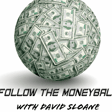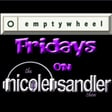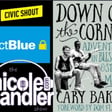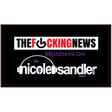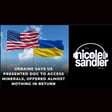Become a Creator today!Start creating today - Share your story with the world!
Start for free
00:00:00
00:00:01

Follow the Moneyball Episode #9
Transcript
Introduction to 'Follow the Money Ball'
00:00:02
Speaker
Welcome to Follow the Money Ball, a podcast at the intersection of sports and money. Here's your host, David Sloan. I'm David Sloan and I have opinions. I also have 44 years of experience as an agent for MLB players that back those opinions up.
Meet Christian Red
00:00:19
Speaker
My guest today is Christian Red. Christian is a sports writer for the online publication, The Messenger. Previously, he was a sports writer for both Forbes,
00:00:31
Speaker
and the New York Daily News. How are you doing, Christian? I'm doing well. It's nice to see you, David. Yeah, it's good to be
Carlos Delgado's Marlins Signing
00:00:38
Speaker
seen. So should I start the interview with how you and I met? We can definitely. Because that's certainly a unique story. So I was representing Carlos Delgado, who originally signed with the Florida Marlins in 2004 as a free agent, and then the Marlins being the Marlins.
00:01:00
Speaker
After the first year of his contract, when his salary was going to escalate significantly, the Marlins traded him to the New York Mets. And Christian, that was one of the teams that you were covering, correct? Correct. Okay. And why don't you take it up from there and I'll interject my, my take as well.
00:01:21
Speaker
Well, the story continues with Carlos Delgado's introductory press conference for the Mets, which I believe was in, gosh, it must have been late November, I want to say, of 2005. And I attended
The Pursuit of an Interview with Delgado
00:01:44
Speaker
that conference. You were there, David. Obviously, Carlos was there.
00:01:49
Speaker
a horde of media was there and many other luminaries, shall we say. And I was tasked with doing a story, not only on Carlos, but
00:02:07
Speaker
in the very hectic schedule that was unfolding that week after he was traded to the Mets, I was tasked to try and get a one-on-one interview with him. Well, as everyone can imagine, in the sports writing world or the sports journalism world, that was a very difficult ask.
00:02:29
Speaker
during his press conference. So I sought you out. I found out who his agent was, which was you. I sought you out at that press conference and asked whether or not you thought that was a possibility, if not in New York, then in his native Puerto Rico.
00:02:57
Speaker
That was a tall order as well, or tall ask. And long story short was Delgado made it clear that he was going to be very busy. He was getting married. That was the big event that was going to take place following his press conference with the Mets. So I worked for a very...
00:03:24
Speaker
hard driving editor named Terry Thompson, a brilliant mind, one of the first female sports editors of a big newspaper slash outlet in the country. And she, back in those days, this is 2005, so back in those days, the budgets were a little bit more robust for
00:03:49
Speaker
New York City tabloids as they are now. And she sent me on a plane down to Puerto Rico to cover not only Carlos' wedding, to try and
00:04:02
Speaker
secure that interview that we wanted for the feature. So I got down there, I drove across the island to Aguadilla where Carlos is from, and I was with a photographer who was actually from Puerto Rico. So that
00:04:20
Speaker
It's a keynote there. That was a blessing in disguise. So not only did he know the island well and speak the language, although I do speak Spanish, he was a native. So he knew his way around and we made our way to Carlos's
00:04:44
Speaker
home, unannounced. And just as we arrived, he was pulling up in his pickup truck, and he had just come from a workout, I think. He was not that happy to see us. But
00:05:05
Speaker
But fast forwarding a little bit, Carlos and I are still friendly to this day, so there's a good ending to this. But anyways, he said, I think you're crossing the line. I'm paraphrasing, but it was essentially, you know, this is a little too...
00:05:21
Speaker
aggressive to get an interview. So I whimpered back to my hotel with the photographer. We thought that was the end of it. But the editors in New York still wanted to, they had sent me all the way down there, obviously. So we attended the wedding. And I believe, hopefully you still have it, David. There's a very famous photo that the photographer I was with took.
00:05:51
Speaker
And it's the happy couple coming out of the church and I believe you're in the foreground.
00:05:59
Speaker
um but needless to say we uh we attended the wedding as outsiders and got some wonderful photos and here's the kicker before we went to the wedding that day i was moping in my hotel room and got a call from an unknown number and this was 2005 so there was no iphones or
00:06:28
Speaker
uh androids or anything like that it was a standard cell phone and pretty primitive if you think about it but i uh i didn't pick up the call um or miss the call and there was a message on it from carlos delgado and he said you know i'm sorry that i uh
00:06:47
Speaker
acted in that way and I'm happy to do an interview with you. So be ready for my call at this time. And sure enough, he called and I was able to do an interview with him before his wedding and do the story. So it all ended well in the end. Well, I'll tell my side now.
Advice for Delgado in New York
00:07:12
Speaker
So after, by the way, I want everyone to know,
00:07:17
Speaker
This predated the release of the movie Wedding Crashers. So I think Christian probably deserves at least a modicum of credit for creating that idea. I don't know if he'll get any royalties from it, but nonetheless, I think he should get at least some credit. So when you and I met up in New York, I told Carlos that you wanted to interview him and
00:07:45
Speaker
I too was unaware that you were going to be in Puerto Rico, but, um, you know, he told me about you coming to the house and, you know, he was just motherfucking everybody up and down at that point. And I told him, I said, you know, you can do that if you want, but understand this, the New York press is vicious and they will kill you if you don't become a little bit more accommodating.
00:08:13
Speaker
because I haven't spoken to Carlos in many years, but he always was a very private person. He was fine with doing whatever at the ballpark, or if he was making an appearance somewhere, he was as nice and outgoing and personable as any athlete I've ever seen. But when he was on his own time, he was a private person. And particularly this,
00:08:43
Speaker
being his wedding, he was particularly concerned about, let's call it the security or lack thereof. I can't say that any conversation I had with him was directly responsible for him talking with you, but I also know him to
00:09:06
Speaker
in general have listened to my counsel throughout the years that we were doing business together.
Christian's Journalism Journey
00:09:13
Speaker
And he may have spoken to other people as well. His father was very influential. His wife was obviously very influential. They may have as well said, it's probably going to be better for you to rip the band-aid off, so to speak, do this and get it over with, as opposed to continually trying to keep not just this one Christian red rider, but the entire New York press at arm's length.
00:09:42
Speaker
So I was very happy that that happened. I thought the piece came off very well. And that's kind of where my relationship with you began. So kind of a interesting beginning. And interestingly enough, when I saw Carlos years later, he called me, quote unquote, the wedding crasher. So
00:10:10
Speaker
He too adopted that, I don't know if it was directly tied to the movie, but my moniker with him is Wedding Crasher. It had to be, it had to be and probably always will be. So that was how you and I met and began our relationship. I'm curious as to how your relationship with sports writing began. Have you always been
00:10:38
Speaker
interested in sports? Have you always been interested and not just interested but good at writing? How did this all begin? I assume that as a kid you probably played little league or whatever and that was at least your introduction to the world of sports as a player but obviously at a point you transitioned from that role to hey maybe I won't play center field for the Yankees
00:11:05
Speaker
So I have this other skill. How can I incorporate my love of sports with this other skill or I don't mean to put words in your mouth, but I'm very curious as to how that happened and when it happened in particular.
00:11:19
Speaker
So yes, I was a big sportsman growing up. I grew up, I was born in Ohio in Cincinnati, so I was a big red machine fanatic, as were my older, three older brothers. And the 75 World Series certainly still is implanted in my memories as a great sporting event of all time, but
00:11:45
Speaker
obviously for me and my brother's, Red's rooting fans. I did not set out to be a sports writer and I did not have any
00:12:03
Speaker
illusions of grandeur that I was going to play center field for the Yankees or the Reds or the Phillies, where I grew up in suburban Philadelphia. So when I finished college, I went straight to New York and worked in the publishing industry for a decade. Then I went back to graduate school for a journalism degree at Columbia.
00:12:28
Speaker
And I still didn't have any specific aspirations to be a sports writer. I just wanted to get any kind of job in journalism and media that I could once I graduated. So I finished in 2002 in New York, obviously. And my
00:12:53
Speaker
First Amendment professor is a very well-known Attorney in the media world and she's a very high ranking Executive with Hearst named Eve Burton So she was not only my professor but many of the students at the journalism schools professor as well for that specific course and after
00:13:21
Speaker
I had the class with her. We became friendly. And towards graduation, she said, you know, what are your plans? And I said, well, I want to try and get any kind of job I can. And she had this Rolodex that you would dream of, of all the newspaper editors, of all the TV station program directors, et cetera.
00:13:44
Speaker
And so she just went down the list and said, what about this person? Do you want to live here? Do you want to go here? And she basically set the stage for at least, you know, scores of leads that I would be able to contact and see if there was any kind of
00:14:04
Speaker
getting the foot in the door so to speak and one of the people that she recommended was Terry Thompson who was Not the sports editor of the Daily News Sports Department at that time. She was the assistant managing editor and then she eventually succeeded Leon Carter, but she had already started her investigative team within the Sports Department at the Daily News, which was
00:14:32
Speaker
not only unique, but one of its kind. There didn't exist any kind of I-team at any other sports department across the country. So that was interesting. Anyways, I was given her contact info. I made an arrangement to meet with her. And this was probably about two or three weeks before I graduated from Columbia.
00:15:00
Speaker
So that's a very key point. So we're talking April of 2002. So I arranged to meet her. I was almost late getting there, but we met at a little, no longer exists, but it was literally one of those old New York diners, like a car, an actual diner car, right up the street from the Daily News, where it was located at the time, which was on West 33rd Street.
00:15:28
Speaker
No man's land. Now it's the Hudson Yards and everything's developed, but then it was a wasteland. So I arrived. She was already sitting in the booth and it was, David, a complete disaster. And for all these listeners,
00:15:45
Speaker
have hope because there is a silver lining to this story. But I arrived and I had not, A, I hadn't really prepared myself for the interview. And anyone can make whatever they want to out of that remark. But more specifically, I hadn't really read a lot of the content in the Daily News
00:16:13
Speaker
Then and recently when I sat down with her, and as I mentioned, she had started this I team. So she asked me, what do you think of this issue we're covering or what kind of issues do you think you would want to
00:16:31
Speaker
pursue and I didn't have any ideas, I didn't have any story concepts, I hadn't read any of the coverage they were doing and that was just on the cusp of the performance enhancing drug boom with all of the Balco and Mark McGuire and on and on and on.
00:16:53
Speaker
So needless to say, there was a lot of crickets and silence throughout the meeting. It didn't last long, maybe 25 minutes or so. And I walked away much like I did with the Carlos Delgado encounter at his home with my tail between my legs and thinking that that was never going to happen with the Daily News.
00:17:19
Speaker
So the summer, I graduated, the summer went on. I did an internship at Inside Edition, if you can believe that, the TV program. As a writer.
00:17:35
Speaker
No, it was really kind of like, it was actually a pretty, pretty intense two or it was almost three weeks I was there. They kept bringing me back. It was paid and it paid really well, but it was like a producer type of internship where you would be given a story assignment and you'd have to do all the reporting.
00:17:58
Speaker
you would get credit for it, but it was nonstop. I mean, they would throw like three or four story ideas at you instantaneously and you had to call and just start building contacts and information for that segment. And then at the end of the summer, we either ran into Eve or
00:18:19
Speaker
Solve her again and she said whatever happened to. The terry thompson interview and i said i was a disaster and she's like i will just call her again you know i'll call her and say that you wanna get in touch with him like i don't think that's a good idea. No no trust me to your car again so i called her again.
00:18:38
Speaker
Talked to Terry and I said, you know, I'm still interested. Is there anything that I could do? I'll empty waste baskets. I'll, you know, lock the doors at night. And she had me come in. Terry had me come in on Saturdays to do high school sports, which is traditionally, no matter where you are, that was the
00:19:03
Speaker
That was the big entry was doing high school sports.
Investigative Sports Reporting
00:19:09
Speaker
Yeah, not only a starting point, but a really valuable one because you not only develop your skills, but you
00:19:18
Speaker
I don't know, there's just something very refreshing about covering high school amateur athletes that is devoid in pro sports. So that was the start and I just kept coming back. I kept asking for assignments. I kept asking to help with her I-team.
00:19:39
Speaker
which was composed of two guys, Michael O'Keefe and TJ Quinn at the time. And ultimately, I was able to work with that group in addition to kind of being a general assignment, features, sidebar person. I eventually did backup beatwriting for some of the pro teams.
00:20:06
Speaker
obviously did a lot of investigative stuff, but the one thing I kind of carved down on my own was using the Spanish speaking skills to do a ton of baseball stories, including David, I mean, Carlos Delgado's wedding, but able to go all around Latin America and do a lot of really unique and compelling stories related to baseball.
00:20:36
Speaker
So tell me, for my listeners, again, I'm talking to Christian Red, writer for the online publication, The Messenger. So two questions. Number one, where were the professors like that when I was in college? Because I never had anyone who helped me much with anything beyond how to roll a joint. Number two, where did you learn Spanish? What was it that prompted you to take that step?
00:21:06
Speaker
So with regard to the professors, that was a unique connection with Eve. And like I said, we just struck up a rapport. There was probably about 200 kids in that First Amendment class. I'm trying to remember the very famous First Amendment lawyer, Floyd.
00:21:32
Speaker
I'm going to draw a blank, but he was part of the co-teaching of that class.
00:21:43
Speaker
probably three or four other really, they were all in my mind, great, great professors, but three or four, including Eve, stuck out as far as just the overall experience. Oh, you lucked out. Yeah. So it was, you know, it's, it's, I just saw an article
00:22:06
Speaker
about the new, relatively new dean of the journalism school, Yalani Cobb, and he has a terrific
00:22:17
Speaker
He's great. I see him on TV all the time. Yeah, that's great but the Opening of the of the story or the profile The author asks him. It's a Vanity Fair piece and Author asked him and I'm paraphrasing, you know how
00:22:39
Speaker
Do you come to grips with the price of journalism program? Now it's $75,000 and that doesn't include housing. It's a nine month program, I think. I just thought that's extraordinary that all to say that if you are gonna invest in that much money into an education,
00:23:21
Speaker
as any undergraduate pursuits or what have you, graduate pursuits. So I was, going back to your point, I was fortunate that I had some really great professors there. And Eve was certainly indebted to her forever for getting me the start.
00:23:34
Speaker
you really have to get as much out of it as you can.
00:23:42
Speaker
As far as the Spanish, I started taking Spanish, gosh, in middle school and took it in high school, continued in college. I went to Hamilton College, which is in upstate New York, and it's a liberal arts college. There's only about 1600 students, so it's very small. But it wasn't until I elected to go abroad,
00:24:08
Speaker
my junior year in college and spend the first semester I spent in Spain. I wish I had stayed the whole year in Spain, but you know, hindsight's always 20-20. My second half was in England, which wasn't at all a terrible experience, but I really wished I had stayed in Spain just for the overall
00:24:36
Speaker
impact on my Spanish speaking because just when I was really getting into a groove and immersed in the culture, I picked up and left and went to a different country and spoke English.
00:24:49
Speaker
But nevertheless, after college and when I first moved to New York, I just tried to continue honing the skills as best I can, whether it was taking classes or trying to speak with native Spanish speaking people and whatever interaction that I came across. And then when I started the Daily News, that was really a great
00:25:17
Speaker
opening of a door. Oh, yeah, that had to be a tremendous asset because obviously a lot of ballplayers are from Latin American countries and you're the only non-native Spanish speaking person I know whose voicemail contains a message in English and Spanish as well. So that's that you're unique in another way.
00:25:46
Speaker
What was the response when you walked up to one of the first few, let's say players from the Dominican or Venezuela and they say, and they see this white bread, uh, sports writer coming up to him and, uh, hablamos in Espanol.
00:26:05
Speaker
Steve, it's interesting. I have to say that the majority of the time, and maybe it was just because it was an unusual circumstance, they had never encountered someone that
00:26:20
Speaker
offered to speak their language during an interview. And I was also new to the field, so my nerves were probably evident just as much as theirs may have been as far as that scenario. So I would say that the reaction more often than not was
00:26:48
Speaker
a shyness that was still there or on your part of the ball player. Yeah. No, I'm part of the ball player. Uh-huh. And, um, I think that that exists, whatever language you're speaking, you know, there's very few professional athletes that right off the bat are just comfortable with the.
00:27:11
Speaker
the presence of many reporters in New York or even one reporter. And that's not to say anything about their character or their person. It's a unique skill to have. And especially in New York, not many people can hit the ground running. I would say Carlos was one of those people. He really had a great, as you pointed out, when he was in the locker room or
00:27:39
Speaker
at an event that he had to speak with the media he was tremendous as was you know his teammate Pedro Martinez was wonderful with the media so there are definitely people that
00:27:59
Speaker
That can can do that but my experience early on was more often than not there it wouldn't be much of a conversation although maybe it was a little bit. More comfortable that i was speaking their language but it definitely help when i was down in the i went to the dominican quite a bit.
00:28:19
Speaker
early on and throughout my daily news tenure. And it helped tremendously there in the other countries as well. But since I went there quite a bit, that was that was a bonus. Oh, you got to go where the players are an awful lot of them. I'm from the Dominican. I'm really kind of surprised to hear that because I would think that at the very least it would make them feel more comfortable because they are going to be able to just
00:28:48
Speaker
speak without having to think what they're going to say and then think of how they have to say it so it comes across well to a sportswriter and then think again in terms of how to use however much English they know to phrase it correctly. So, you know, it would seem to me that it would certainly have made them a lot more comfortable. I'm surprised that that wasn't necessarily the case.
MLB and Language Inclusion
00:29:14
Speaker
Are there any stories that were funny or interesting in regard to that issue, number one and number two? Were there any situations where, for example, you're standing around Carlos Beltran's locker and there's you and three or four other sports writers and someone's asking him a question and maybe his English was okay. Maybe he didn't understand it well, or maybe he really wanted to be able to express it in Spanish better.
00:29:44
Speaker
Were there, were there any stories like that where you heard, you know, we, we kind of turned to you and said, answer Christian, here's the answer. And then you translated for the other sports writers.
00:29:55
Speaker
Well, I never had that happen. But I will say before I answer your questions, the interesting change that Major League Baseball did do, which I thought was long overdue and many other writers, I think, had written about it or voiced the need for it. But now all clubs have
00:30:25
Speaker
translators not only spanish but japanese for instance or korean whatever korean whatever country they come from if that's their native language then there's a translator for that um at the major league level minor leagues i don't believe it's yeah i don't think i'm not sure but i i believe you're correct um
00:30:49
Speaker
But that's a really unique change and helps a lot. And even when that was implemented and I would go to a locker room, I would...
00:31:05
Speaker
tell the translator, I can ask these questions in Spanish if he prefers. And that sort of defeats their role. They're there to facilitate the interview. So that creates a unique thing. But I think that more often than not, it's appreciated if you do present that
00:31:33
Speaker
options. I can ask these questions in Spanish and, you know, whether or not they want to answer in Spanish or talking Spanish is another story, but that's a unique thing. As far as
00:31:47
Speaker
I've never had that happen where someone asked me amongst a sports writers group to translate for them. You know what happened more often than not is that another teammate who also
00:32:06
Speaker
spoke Spanish or was Spanish speaking, whether or not they were from the same country, they would often be drawn in. Like Mariano Rivera famously did a lot of translations, I think, for El Duque and some of the other players that didn't have a command of English. So that was what usually happened is someone else would step in that was a teammate that could facilitate that.
00:32:34
Speaker
That's interesting because, as you know, oftentimes, different countries, there's one word that, if you hear it from a Cuban, has a different meaning than if you hear it from a Puerto Rican or if you hear it from a Mexican. And, I mean, I've experienced that and me espeñol is, muy piqueno y muy malo.
00:33:01
Speaker
So even I know that with my miserable Spanish. So you mentioned to pivot to a somewhat different area, but you kind of touched on it a moment ago.
Balco and MLB Drug Testing
00:33:16
Speaker
You mentioned the Balco situation.
00:33:20
Speaker
You know, there's a really interesting documentary now, I believe, on Netflix. Yes. Have you seen it yet? I've not only seen it, but that was one of my first stories for The Messenger. Okay. Wasn't a review as much as a feature on... You know what, now that I meant, now that you mentioned it, I saw you posted about that, and that's what made me hunt it down.
00:33:46
Speaker
Yes, so I did see the documentary and my story for the messenger.
00:33:54
Speaker
More or less, well, it incorporated what I thought was some more voices of people, individuals that were linked to that case, which I thought maybe gave it a little bit more breadth. I did think that 77 Minutes, which is the length of the documentary, was way too,
00:34:22
Speaker
small a window of time, not nearly enough to incorporate all of the layers of that case and the history, um, in the context. And I thought that it would have been better served as a, like a docu-series where they had, you know, X amount of episodes.
00:34:40
Speaker
Yeah, where they covered Balco in one and then Biogenesis in another one and then another, you know, the involvement with the agents and all the rest of that stuff. Or the way I thought of it was that cover Balco only, but just do it in six or seven episodes so that you could incorporate all of the
00:35:01
Speaker
Like I said, the history, the context, all the key, quote unquote, players that were part of that. Because it was a, you know, it's a very important historic footprint in the sports landscape, I think. I think a lot of people would agree with me.
00:35:20
Speaker
As far as just the lead-up to it with McGuire and Sosa and the home run chase and the pre-testing era to implementing a drug testing program in baseball and other leagues to the fallout from
00:35:41
Speaker
all of those scandals, like you mentioned, the biogenesis in addition to Bauco, and there was a couple of others in between there involving PEDs. Well, I'll tell you my personal experience with that, and I actually have a letter right over there that I received in return from a letter that I sent. One of the first articles that I saw
00:36:10
Speaker
Bigging even beyond scratching the surface in regard to steroids was done by Mark Fenner water. Yes I Sent him a letter essentially saying what you wrote was very interesting, but you barely scratched the surface I said there's so much more to it than what you've written and Keep my name out of it. But here's some other things you may want to look into and lo and behold later on he did I had a client
00:36:38
Speaker
who his name will be unmentioned, who essentially came to me and said, I may be the only guy on my team that's not doing steroids. And I don't know what to do about it. And I told him, don't do anything about it. Just keep doing what you're doing. You're playing well. Let those other guys do their thing and just keep your head down and keep playing.
00:37:06
Speaker
And he was concerned in that. And this is a typical, um, spot expressed by many players. I don't want to lose my job now that I've gotten myself to the majors. I don't want to lose my job to a guy who otherwise was a triple A player, but now he's taking steroids and he's put on 25 pounds of muscle. And because of that 25 pounds of muscle, he's going to come up here and take my job. Yep.
00:37:37
Speaker
So I told him, I said, you know, there's really not much I can do about it. I will try on the next opportunity that I get to address the subject with the people from the Players Association. And this particular conversation happened toward the end of the season.
00:37:54
Speaker
And as you are no doubt aware, there are meetings a couple of times a year, generally during, after the end of the baseball season and during spring training, where the Players Association gets together with agents and has a discussion with them. It's more, well, back then it was more of a lecture than a discussion. There wasn't a whole lot of interaction.
00:38:22
Speaker
And Don Fair at this point was now running the Players Association. And I believe this was back in maybe 2000. And generally the way it went was Don would come on and he would make his presentation as to here's what we've done in our discussions with the labor relations people from MLB. Here's what we've tried to do in terms of marketing MLB players. Here's what we've done on the legal front.
00:38:51
Speaker
And, you know, at whatever point it was appropriate time-wise, there would be a break and they always had, you know, sandwich makings in the back and you can go make yourself a sandwich. And then after the break for lunch, John would finish his presentation and bring on the other people there, Gene Orza, Evan Kaplan, whoever, you know, else happened to be there from the third session.
00:39:18
Speaker
So at this particular meeting that I went to, which was in Los Angeles at the break, I went up to Don and I'd known Don for many, many years at that point, going back to the eighties when he was an attorney under Marvin Miller for the Players Association and one of several. And I said, I need to talk to you. And he said, what do you need to discuss? And I told him, I said, I have a client. I'm not going to name him.
00:39:44
Speaker
One of these told me he's probably the only guy on his team that isn't taking steroids. And he told me there's nothing we can do about it. It's not an issue for the union to deal with. And I said, how can it not be? And he said, the owners have brought it up where they want us to go along with testing.
00:40:07
Speaker
And that is intrusive and we don't agree with it. And we're concerned that if we allow them to test for one thing, they're going to want to test for another thing. And they're going to use the information that they gain in testing against players. And I said, I understand the slippery slope argument, which you're trying to present to me at this time, but this is in and of itself, a separate issue. All to itself.
00:40:38
Speaker
And I told him, you need to do something about this. And he said, it's just not an issue for the union to handle. And I replied to him, I said, look, my dad was involved with labor unions back in the twenties and thirties. And I know enough about him, about labor unions from that and from what I learned in school, that one of the primary functions of a labor union was to ensure the health of its membership.
00:41:02
Speaker
And the studies even back then were conclusive. Long-term steroid use was deleterious to the user's health. How can that health issue not be something that the union would take a role in? And he said, I'm sorry, I understand your concern. I understand your client's concern. Please tell them that we've had this conversation, but there's nothing that we can do about it.
00:41:29
Speaker
And it was only after the inflection point that we were just talking about in regard to Balco, when it became so big that they could no longer ignore it. They could no longer sweep it under the rug that they finally did something about it. Now, fast forward to today. I would bet every dime in your bank account that there are an awful lot of players
00:41:57
Speaker
doing an awful lot of things that enhance their performance. And just as is the case and always has been, primarily in Olympic sports, the real contest isn't between the eight guys competing against each other in the 100 yard dash, it's between their trainers and
00:42:21
Speaker
pharmacists staying one step ahead of the anti-doping people. Yeah. Yeah, absolutely. It's interesting. So you mentioned the meetings held by the Players Association. And I remember when I first started at the Daily News, so that was in August of 2002 or September of 2002, early September.
00:42:49
Speaker
and the players association and the league had just I'm pretty sure that was the year they had just ratified a new cba collective bargaining and that was the biggest the drug testing
00:43:09
Speaker
And if you'll recall the following- You froze there for a second, Christian. I was saying that that was the biggest and most contentious issue was drug testing. They had the following year in 2003 was the survey testing year to see if there was a certain threshold to implement a drug testing program. Sure enough, that threshold was met, but I remember- Full shot.
00:43:36
Speaker
Total shock and surprised everybody that the threshold was not. Yes. But I remember how contentious reading about how contentious that issue was. And, um, I, I would, I would say that I agree with the given all that I've come across in reporting and
00:43:59
Speaker
writing about this issue, you're absolutely right. That was one thing I did think that the documentary sort of alluded to is that there's always going to be chemists or pharmacists out there that will give a professional or any athlete of any level
00:44:23
Speaker
an edge and they're always going to be the athletes that want to get that edge. So they'll, you know, Hey, the thing that I always remember that stuck out to me is I, um, interviewed and, um, maintained several sources that were either, uh,
00:44:51
Speaker
providers or distributors of PEDs. And one of them said to me, you have to remember that when there's a multi-million dollar contract at stake and it's between getting X amount of home runs or X amount of RBIs and this PED will help you achieve those
00:45:21
Speaker
milestones, you're going to probably think about it a lot harder to do it than not because of the economic windfall that, you know, could be coming your way if you achieve those goals. Without a doubt, without a doubt. And to go back to my story for a moment, lo and behold, despite the testing implemented,
00:45:50
Speaker
it hasn't blown up in the player's faces. There hasn't been a situation where owners have used the blood testing and say, well, you know, your urine testing. We've tested your urine and while we didn't find any steroids, we found that you have pre-diabetes. And because of that, we are going to insist in your next contract that X, Y and Z have to be done. Or you have this other condition
00:46:19
Speaker
Um, that shows up in your urine and we're going to, we're going to not re-sign you because of that. So, so the, the nightmare, if you will, occurrence that Don Fair was trying to prevent has never occurred as a result of the testing. So now I know also, I mentioned a short while ago, biogenesis, which was the subject of a book that I was just looking for the book, but I packed it away
Baseball Investigations and Biogenesis
00:46:47
Speaker
already. Baseball cop.
00:46:49
Speaker
Yes. You were, were you a co-writer on that? Cause I can't remember exactly, you know, what it says. That is the correct title. It was, it is called baseball cop. It was co-written with myself and Terry Thompson, the woman I mentioned earlier in the interview, uh, who was the daily news sports editor for, um,
00:47:16
Speaker
almost a decade and Eddie Dominguez was the subject and he was also a co-author. So the two of us collaborated with Eddie and he was a former
00:47:32
Speaker
First, a resident security agent with the Boston Red Sox. And for those listening that don't know what that is, that's basically the security force for major league clubs. And later on, he was one of the founding members of the Department of Investigations within baseball. And that unit was
00:48:01
Speaker
uh, recommended by George Mitchell. So the former Senator that created the Mitchell report, which was a, yeah, history of baseball's doping issue. He had many recommendations at the end of the report, but one of them was to, uh, for baseball to establish an investigative unit separate from the, um,
00:48:30
Speaker
Labor Department and autonomous in the sense that it would carry out its own investigations and report to. Well, then it was Bob to pay was the president. And.
00:48:47
Speaker
The book is not only a look at Eddie's work within baseball, but it's a memoir of sorts. It traces back to his Cuban roots. He was born in Cuba right before Castro took over, lived through Castro's regime. Then his family fled Cuba, and he was a Boston
00:49:14
Speaker
police detective for almost 30 years, including the time when he was a resident security agent with the Red Sox. So the biogenesis scandal, as you just mentioned, David, factors very prominently in Baseball Cop, the book, because that was
00:49:35
Speaker
The big case, but also the last case that Eddie worked on before he and several other DOI members were terminated. But yeah, it was certainly a case that garnered Lake Balco a lot of attention.
00:49:56
Speaker
Certainly for Alex Rodriguez being the biggest name in the group of players that were ultimately suspended by baseball. Well, and it took place in your backyard, David. Yes, it did right here in beautiful South Florida.
00:50:15
Speaker
Beautiful South Florida with the emphasis on the Miami New Times. Kevin Elfrank did a lot of coverage on that as well. And unfortunately, as is the case often with many of these, let's call them scandals, the people that got punished the most were the ones who profited the least.
00:50:40
Speaker
Um, the guy, I can't remember what his name was. The, the doctor behind the guy, the whole thing at biogenesis. Yeah. He, he, he was punished somewhat, but, um, while Alex Rodriguez was painted by it, his checks didn't stop. They did not. He still made plenty of money. All the other players that were involved in it, they had some minor consequences, but nonetheless,
00:51:09
Speaker
The ones that were still good players, their careers continued. The agency, the sports agency that represented, if I recall correctly, it was something like 12 out of the 15 players that were directly implicated in that scandal. They're still doing business. They're still collecting millions of dollars in commissions. They never got so much as a wrist slap.
00:51:34
Speaker
As a result of their involvement in this and you know their their whole. What was the guy's name? Do you remember the name of their employee who was the one who was directly getting the steroids from biogenesis and distributing it to their players?
00:51:54
Speaker
Well, interesting, so yes, there's an interesting, separate piece that's related to Genesis. But before I talk about that, so I agree with you on Alex Rodriguez, he didn't lose a whole lot, but he did forfeit his pay for 2014.
00:52:23
Speaker
granted that was a, you know, probably a drop in a lot of money. Yeah. A lot of money to the average human being, but nothing to him. Yeah. Um, but the, there was an individual, um, who was part of, uh, the group that was indicted by the government. Um, and
00:52:49
Speaker
His name is escaping me at the moment, but he did work for the ACEs Agency, Seth and Sam Levinson. And ultimately, he filed suit against ACEs after the Biogenesis Matter had more or less concluded. And
00:53:14
Speaker
I did a story while I was still at the Daily News on that lawsuit, but there wasn't a whole lot of coverage and stayed pretty quiet as it unfolded, but ultimately he settled, which is probably what a lot of people would have expected to be the outcome.
00:53:38
Speaker
But when I did the one or two stories on the lawsuit being filed, he was represented by a boutique law firm in New York City. And one of the attorneys said to me, the Biogenesis group of names is only the tip of the iceberg.
00:54:02
Speaker
meaning that there was more names that would likely come through, whether it was discovery or trial, whatever. But obviously we never got to that stage and, uh, the names, if there were any others never came to light, but that was why the case was settled. That's why the case was settled was to bury them. Absolutely. Absolutely. And buried all that. Yep.
00:54:31
Speaker
Yep. So, and, and the players association did their own air quotes investigation of ACEs, which probably consisted of, I'm trying to remember if Michael Weiner was still alive back then. Um, this was after. Okay. So it probably consisted of Rick Solomon or one of the other, um, gentlemen.
00:54:55
Speaker
associated with the Players Association, picking up the phone and calling the people at ACEs and saying, did you do it? And the people at ACEs saying no. And that was the end of the investigation. There was a release by, I believe, Tony Clark that said, I'm paraphrasing, but it was essentially said that they were not been found to have created any illegal breaking of laws or rules
00:55:24
Speaker
Yeah, they were blameless. And if you buy that, there's some land about nine miles west of me. That's only about four or five feet underwater. And the alligators that live there are pretty friendly. You just have to be careful when they haven't been fed for a while. I'll gladly sell you that land if you believe that. So do you see any stories coming up today?
Future of Sports Reporting
00:55:56
Speaker
that because of the change in whether it's the games or how they're played or how they're covered, that you would say maybe not necessarily scandals, but things that let's say come down the pike in the next
00:56:15
Speaker
six to 12 months that may be eye-openers for the average sports fan. Well, what do you anticipate being the big things to come from the next football, baseball, basketball seasons? On any particular issue or just in general?
00:56:34
Speaker
just anything, anything in general, whatever, whatever you see, because now that you're doing this for the messenger, I'm sure you're all over this like a cheap suit on a pretty much 24 seven basis, because I have to imagine that working for an online thing as some greater immediacy and please correct me if I'm wrong, then, you know, working for a pay a dollar for an actual physical newspaper type of operation.
00:57:04
Speaker
I think it's a little bit of everything. It's a traditional news outlet, The Messenger, with all verticals, news, politics, entertainment, sports. The sports vertical is actually launching next week, although there has been coverage for more than a month now and content in that section. But it's a traditional outlet like any other,
00:57:33
Speaker
So as far as being all digital in the immediacy, yes, there is that element with breaking news or if any reporter is astute enough to get a scoop, that would be an occasion for
00:57:53
Speaker
urgency to get it posted so that you could be the first to do that if it's still an opportunity to do those kinds of things in this day and age. I think reporters jump at that. But there's also features in the sports department, enterprise stories, investigative stories that will require not only more time to report and
00:58:24
Speaker
and develop, but that won't necessarily mean a deadline of sorts. You have to get it in by this time. So I don't know if that answers your question, but it kind of circles it. Christian, please, if there isn't anything that really comes to mind, that's fine. I think, well, certainly for New York,
00:58:52
Speaker
There's the baseball story of the two pro teams spectacularly collapsing. Shooting the bed, I think, is the technical term. Yes, I think that's an ongoing story that will have endless readership because of the nature of what they came into the season being predicted to do and what ultimately happened.
00:59:21
Speaker
I think Aaron Rodgers with the Jets is going to be an ongoing, hopefully he will get injured. But that, as you know, is a 50 plus year saga for Jets fans since Joe Namath guaranteed and followed through with a Super Bowl victory. They're waiting for that to happen. They've been waiting and he
00:59:44
Speaker
Seems like the first legitimate chance in a long time for maybe possibly getting to that stage. So I think those are big New York stories. They've got a basketball team there too, don't they? In New York, what's the name of that team again?
01:00:01
Speaker
Yep, they've also been waiting a while. I don't think they're closer than the Jets are as far as that's concerned, but that's just me. I think Otani is an incredible story and I'm sad that he got injured recently and I'm, you know, like every other fan worried about coming back from a second Tommy John surgery after I've already done that procedure.
01:00:25
Speaker
But I still think he's an incredible once-in-a-lifetime talent. Well, James and Tyron, and some other players have proved that it's possible to come back from a second Tommy Johnson. Yeah. And you've been covering the sport for a long time. Let me ask you from my perspective, if I was representing the guy, I would negotiate a one-year contract for him and maybe some options.
01:00:54
Speaker
That would give him the opportunity to opt in as opposed to opting out of something. Whereas where after a year, if he wants to remain with that team, then another four or five, six year contract would kick in.
01:01:09
Speaker
Or he could become a free agent and give him a year to contribute as a hitter and pay him as such. And he continued to rehab himself from the Tommy John surgery. I'm really surprised you mentioned Otani. I'm really surprised he didn't just blow off the rest of the season and get the Tommy John done now, as opposed to waiting another, what, six, eight weeks to, to have the procedure done and pushing his recovery out by another six or eight weeks as well.
01:01:37
Speaker
Yeah, it's a and ultimately, I would think some people would call it a head scratcher because he could do that, although I don't know. And I don't think it's been revealed whether or not that might be the best option to do right away. And I also know that
01:02:05
Speaker
is that he's a competitor. And this was maybe the closest that the team was going, I mean, earlier on this summer, of course, but now it looks like they're trying to play catch up with the rest of the division to try and make the playoffs. And I'm sure he felt like maybe this was his best chance with this team to get there. And they did some moves at the trade deadline.
01:02:31
Speaker
But once it was diagnosed, get it done. If he does indeed get Tommy John, I think your point about a one-year contract is a very astute one. And I would guarantee, to a name of guarantee, that teams are
01:02:52
Speaker
thinking about that strategy and all the teams I'm sure are trying to, that can afford a player like that are looking to get their package together, their recruitment package. But I would think that would be the smartest thing to do because if he does get the surgery, he's not going to pitch next year. He's not going to play.
01:03:16
Speaker
So, well, that, that was my point. If he has the Tommy John done immediately upon being diagnosed, he would have recovered soon enough by the end of next year, more than likely to swing a bat. And he would have been able to continue his rehab as far as throwing a ball was concerned along with that. But his, his meeting would probably.
01:03:43
Speaker
And I emphasize probably I'm not a doctor, I don't play one on TV, but I've watched what's happened with position players who have had time each other. They've come back and been able to swing a bat fairly quick. It's the whole issue regarding throwing, but his whole career over here has been kind of a
01:04:03
Speaker
uh, mystifying experience for me, because he could have picked any team in baseball and he picks the angels and the angels are a cluster fuck. They've been a cluster fuck for years, why he would sign with them over one of the other teams that was pursuing him, the Dodgers, the Yankees, somebody like that, somebody with a much more firmly established tradition of winning. It was a mystery to me, but you know, no one asked me at that point.
01:04:32
Speaker
It's a mystery I think to a lot of people and I just recall even maybe last year where the Angels would have a game and he would hit a home run and
01:04:47
Speaker
three RBIs and Trout would have an equally good offensive game like Trout and they would still lose by like 10 to 6 and it would happen again and again and he would pitch days that he pitched he would be remarkable but there was no offense behind him so they would lose that game and it just makes you cringe to think about this talent
01:05:12
Speaker
And yes it's awesome to watch so the fans are at least getting this incredible elite athlete doing these incredible things but for him and for angels fans and for anyone that appreciates the game to see that again and again happen where they're
01:05:35
Speaker
Yeah, it's it's like putting Secretariat. It's like pulling Secretariat pulling a plow. Yes, exactly. Just a shame. Just a shame. A lot of good analogies. That's a good one. So again, I'm speaking with Christian Redd, sports writer for The Messenger.
Christian's Role at The Messenger
01:05:50
Speaker
Is your beat going to be
01:05:53
Speaker
exclusively or primarily the New York teams or will you be covering sports in general? Will you be focusing on a particular sport or will you be kind of across the entire spectrum? So the short answer is I will not specifically be covering the New York teams and my role as a senior writer will be to
01:06:20
Speaker
do enterprise type stories, investigative type stories, some of the things that I did at The Daily News. But also explore other projects that will hopefully be unique. And some of those are still in development or being discussed or explored. But the writing element, it will primarily be longer form stories.
01:06:47
Speaker
Okay, so for my listeners that are interested in following your writing, is the Messenger a subscription-only publication? Oh, that is one of many unique elements of this Messenger endeavor is that, at least for now, it is not subscription-based. It is content
01:07:14
Speaker
or the reader. How are they going to make money and when can we expect them to go out of business? Hopefully not the latter anytime soon. The person behind the messenger is a media titan named Jimmy Finkelstein and for as
01:07:34
Speaker
long as he's been in the business and for as successful as he's been in this field. He's a very under the radar guy, but I would encourage people to read. There's a Vanity Fair piece that came out earlier this year with an interview of him.
01:07:52
Speaker
And in that piece, not only does he discuss this new Messenger venture, which launched earlier this year, but also talks about those very things that you just questioned. How are they going to make money? And I'll answer that in addition to the challenges that
01:08:16
Speaker
he or any media tycoon faces, that I think is the biggest challenge for any media outlet going forward.
01:08:26
Speaker
And monetizing the content. Exactly. You know, my wife, Nicole Sandler, you've been on her show. She interviewed you about the baseball cop book. And just this week, she had on her show a gentleman by the name of Will Bunch, who writes for the Philadelphia Inquirer. And he was talking about the fact that
01:08:50
Speaker
his paper has had to go to a subscription model. And I guess part of his deal with the paper allows him to have his own newsletter. And the newsletter is free. But if you want the content from the Philadelphia Inquirer, so the editorials that he writes for the Inquirer, or the stories that other people write directly for the Inquirer, it's a subscription.
01:09:20
Speaker
And some of the things that he writes that originally appear in the paper, then later on go out in the newsletter and vice versa. But, um, it sounds like an interesting, uh, uh, tab at it that, uh, what was the gentleman's name? Jimmy Finkelstein. Jimmy Finkelstein sounds like an interesting stab that he's making at it. And let him know if he's interested in putting on a good sports podcast, that, uh, I'm available and, uh, I don't work cheap, but I work reasonably.
01:09:50
Speaker
And you know where to find me. I do. And that's it for another edition of Follow the Money Ball with your host David Sloan. To make a comment or a suggestion for a future guest, reach out to David at followthemoneyball.substack.com. Thanks for listening. See you next time.

